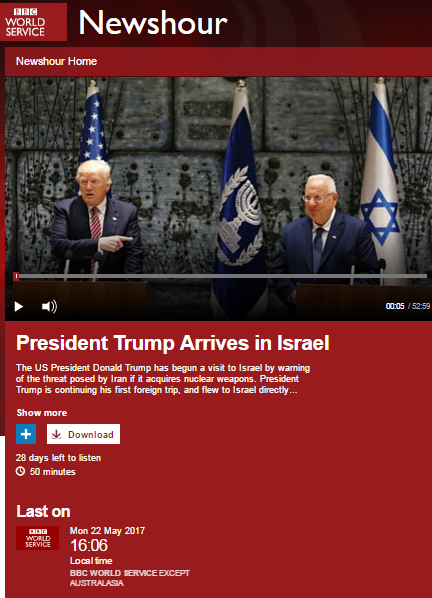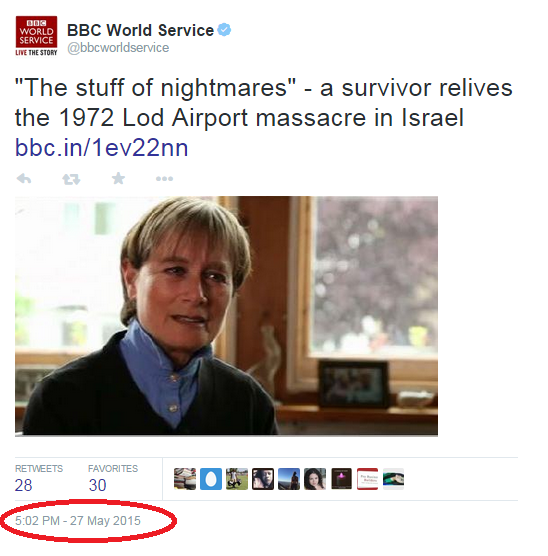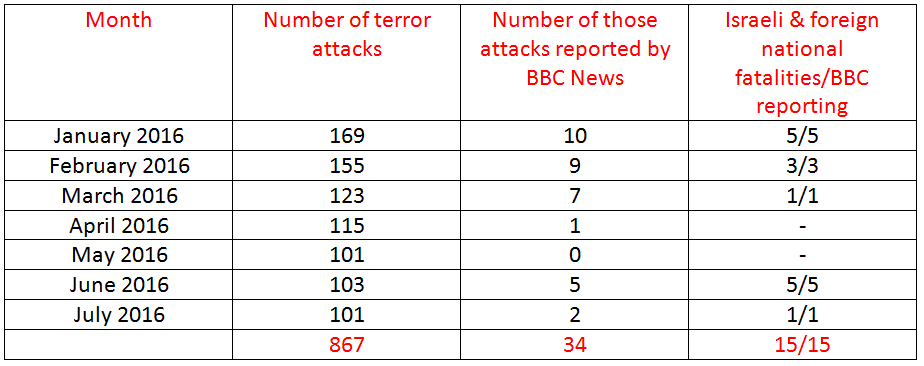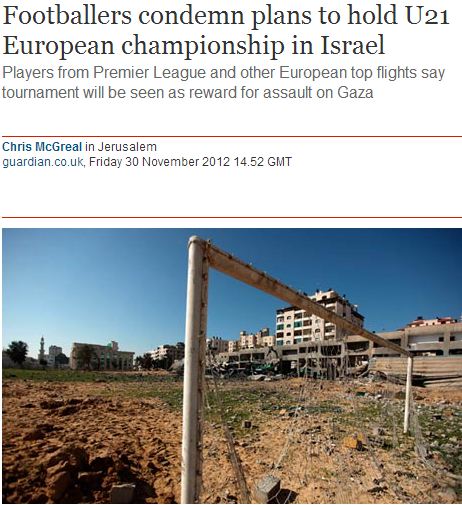The lead story in the May 22nd afternoon edition of the BBC World Service radio programme ‘Newshour‘ was the visit of the US president to Israel which, at the time of broadcast, had commenced just a few hours earlier.
Presenter Razia Iqbal introduced the item (from 01:07 here) as follows: [all emphasis in italics in the original, all emphasis in bold added]
“We begin though with President Trump’s continuing visit in the Middle East. He’s now in Israel having flown direct from Saudi Arabia; in itself a first as there are no diplomatic relations between those two countries. And he arrives having cast himself as the world’s greatest deal-maker, nodding towards what would be the world’s biggest deal: peace between the Israeli and the Palestinians…Israelis and Palestinians. More than two decades of failed peace talks show how difficult a deal between the two sides has been and despite Mr Trump’s deal-making claims, there is deeply held scepticism over what progress can be made. We’ll be assessing what scope there is for movement in what’s been a stand-off for some time.
Speaking shortly after arriving in Tel Aviv, President Trump said he had found new reasons for hope during his recent travels. [recording of Trump speaking]. And the prime minister of Israel Benjamin Netanyahu said his country was committed to achieving a lasting peace agreement. [recording of Netanyahu speaking]”.
Iqbal then introduced the person that ‘Newshour’ bizarrely deemed appropriate to provide the opening comment on this lead story – BBC frequent flyer Mustafa Barghouti.
Iqbal: “Well in contrast to the public rhetoric, underlining the mammoth task ahead of anyone attempting to tackle the possibility of peace in the Middle East [sic], a Palestinian official, Mustafa Barghouti, speaking to the BBC reminded President Trump that achieving peace would not be an easy process and would require significant concessions from Israel.”
Barghouti: “There is a military occupation of the Palestinian territories since 50 years and without ending the occupation there will be no peace. We want him to remember that this occupation has become a system of apartheid much worse than what prevailed in South Africa at one point in time. And we want him to remember that there is a need for the Palestinian freedom; a need for Palestinians to have their own independent and sovereign state. Without a Palestinian state there will be no peace.”
There is nothing to indicate that Barghouti was speaking live with Iqbal. Rather, this apparently pre-recorded statement with its promotion of the politically motivated ‘apartheid’ calumny – which the BBC knows full well to be a falsehood used as a propaganda device to delegitimise Israel – was selected by the programme’s editors for inclusion in the item. Not only did Iqbal fail to clarify to listeners that Barghouti’s smear is baseless, she subsequently repeated it, as we shall see later on.
Iqbal continued:
“Palestinian official Mustafa Barghouti. Let’s speak now to our correspondent Tom Bateman who joins us live from Jerusalem. So, ah, Tom – the…eh…arrival of President Trump and his wife – there was quite a lot of warmth and friendliness at the airport. How’s the visit gone so far?”
After Bateman had described the security arrangements in the Old City of Jerusalem as the US president visited the Church of the Holy Sepulchre and the Western Wall he went on:
Bateman: “And these are really the symbols of this visit. What we have yet to have is the substance and that is on two really key issues, I think. Firstly, following on from his visit to Saudi, as you heard there from the president himself, he wants to create a regional coalition which will include Israel. And this is really his attempt to reset US foreign policy after that of President Obama about whom he was so critical because he believes, as he said, that he thinks there is a common threat here to the Gulf states, to the majority Sunni countries and to Israel and that is in the form of Iran.”
Following Bateman’s outlining of his second ‘key issue’ – “peace between the Israelis and the Palestinians” – Iqbal picked up on his previous reference to Iran.
Iqbal: “You mentioned Iran and there was some criticism of Iran when the president was in Saudi Arabia and he has underlined that criticism again today in Israel hasn’t he?”
Bateman: “That’s right and, you know, I don’t think that’s going to be the last of it and of course it’s a message that resonates with Israel because Israel’s government is extremely concerned about Iran. They believe that…ah…because of its action, that they say it’s arming Hizballah just north of Israel here in Syria [sic], that that brings an even greater threat – in fact its greatest threat in the form of Hizballah just over its border in Lebanon.”
One would of course expect a BBC correspondent based in Jerusalem – new or not – to be capable of informing BBC audiences that Iranian financial and military support for Hizballah (in violation of UNSC resolution 1701) is not just something that the Israeli government ‘says’ but a fact about which Hizballah has been open and at least one Iranian official has admitted.
The Iranian angle to this story reappeared again in a later item in the same programme which will be discussed in a subsequent post.
Following her conversation with Bateman, Razia Iqbal introduced her next guest – former US ambassador to Israel Dan Shapiro. During that conversation Iqbal recycled Barghouti’s ‘apartheid’ calumny (10:52):
Iqbal: “I mean there are huge, huge challenges on both sides and there has been of course a stalemate and no real peace process for…for many years now. What do you think he [Trump] will make of the line he is almost certainly going to get from the Palestinians which we heard a sense of from Mustafa Barghouti: that there is this military occupation, that it’s really become a system of apartheid and it’s much worse than what prevailed in South Africa. How do think that will be…that will go down with President Trump?”
Shapiro: “I don’t think he will accept that narrative as a complete and accurate narrative of the situation. […] I don’t think he will accept that narrative – nor do I think he should.”
Iqbal: “Well if you don’t think he should accept that narrative, what’s your assessment then of both President Trump and his son-in-law and special envoy Jared Kushner and their attempts to really try and bring about something that has been so elusive?”
The editorial decision to promote Barghouti’s patently false and baseless ‘apartheid’ calumny in this item is further underscored by Iqbal’s repetition of the smear. This is not a case of a presenter inadequately responding to an inaccurate statement made by a guest during a live interview. This is the BBC World Service intentionally providing amplification for a falsehood used as part of a political campaign to delegitimise Israel and it clearly does not meet the BBC’s supposed standards of ‘impartial’ journalism.
Related Articles:
Nasrallah speech necessitates update of BBC’s Hizballah profile
An Iranian story the BBC chose not to translate
Resources:




